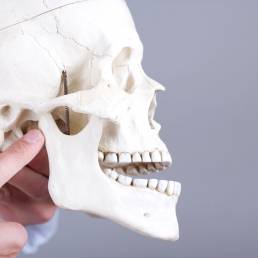TMJ
The temporomandibular joint is the joint of the jaw which we commonly refer to as the TMJ.
TMJ disorder is a general term that refers to the pain or discomfort in the temporomandibular joint area. It is a very painful condition which involves the jaw joint and the muscles surrounding it.
TMJ disorder may present with some of the following symptoms:
- Dull, aching type of pain in the jaw
- Difficulty in swallowing, biting or opening and closing the mouth
- Headaches and dizziness
- A clicking and popping sound on opening and closing the mouth
- Pain in the ears
- Stiffness in the jaw muscles
There are a range of treatment options available for patients experiencing pain and discomfort in this area. At Deall Dental we can help get you on the path to recovery.
Call today to book a consult

Frequently asked questions
As part of your dental examination our dentists will assess you for TMJ disorder. There are various treatments available including:
- At home exercises: You can apply warm compresses over the painful area. Exercise your lower jaw by moving it side to side and trying to open and close your mouth. Try this after you apply a warm compress for 20 minutes.
- Medications: Muscle relaxant medicines are prescribed which will help control muscle spasm and pain. Non-Steroidal Anti-inflammatory Drugs (NSAID’s) like ibuprofen will reduce pain and swelling.
- Physical Therapy: Physical Therapy exercises help relax your muscles and improve jaw movements. Physiotherapists make use of Transcutaneous Electrical Nerve Stimulation (TENS) unit and ultrasound which promotes tissue healing and helps relax your muscles.
- Splint therapy: This treatment is suggested to eliminate the effects of clenching or grinding the teeth. A splint is an appliance that fits over the chewing surfaces of your teeth. It is worn for 1-3 months or more.
- Orthodontic Correction: If your TMJ disorder is caused by the way your teeth fit together, it may help if the occlusion is corrected. Orthodontic braces will be used to reposition your teeth. If there is malalignment in the jaws, orthognathic surgery is required to change the positions of the jaw bones.
- Cosmetic injections: Cosmetic injections can be used to alleviate pain associated with the TMJ (jaw joint), it can relax the large chewing muscles which can in turn relieve headaches and jaw aches associated with grinding and clenching.
- Surgery: Surgery is the last resort which is considered when all other treatment methods have failed. Surgery may be necessary if muscle spasms increase in frequency, TMJ has become arthritic or when there is injury to the joint.